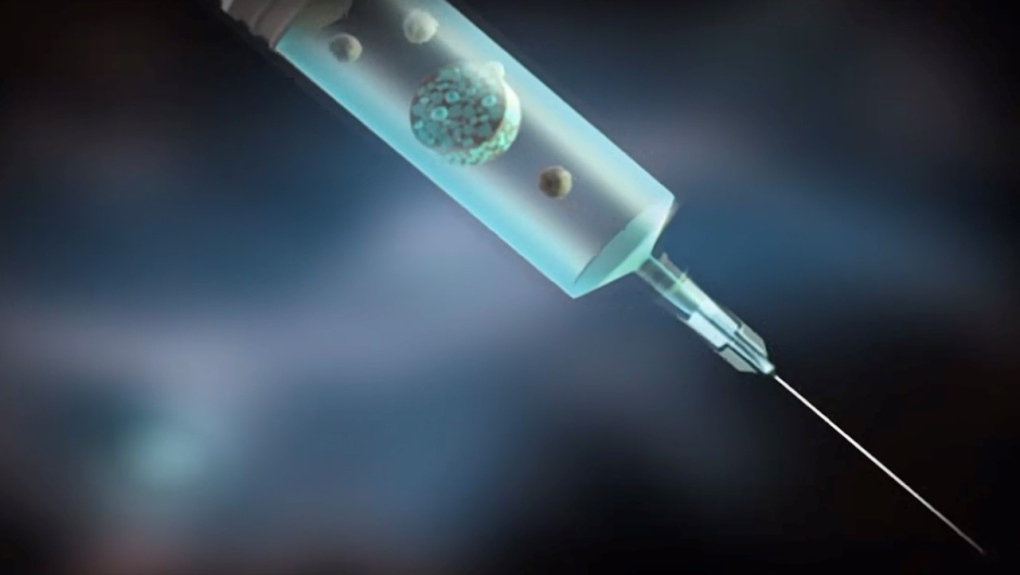
One needle could 'inject' repair for a weakened human heart: Western University
 An injectable potentially heart healing patch is seen inside a syringe in this supplied computer image from Western University.
An injectable potentially heart healing patch is seen inside a syringe in this supplied computer image from Western University.
A new medical device, created in London, Ont., may be able to repair weakened hearts with only an injection.
Designed by Western University Engineering Professor Kibret Mequanint, the device is basically a patch, small enough to pass through a needle.
“This material can be squeezed into a syringe or catheter and can be injected directly to the sight of the weakened heart,” Mequanint tells CTV News London.
Soon, its creation could offer hope to those recovering from heart attacks or waiting for a heart transplant.
Mequanint has already completed a short-term study on small pigs in conjunction with the University of Manitoba.
It found “encouraging results” as the pigs experienced improved heart function and blood flow.
A second, six-month study showed none of the animals experienced any toxicity complications from the patch.
Made of three components -- elastin, gelatin and carbon nanotube -- the patch has a unique feature, separating it from existing methods of heart repair.
For one, highly invasive open-chest surgery is avoided.
Secondly, the patch can remember its shape, allowing it to expand after it passes through a needle or catheter.
Mequanint admits the latter would be the likely method of delivery in humans.
Humans could also benefit from the conductive abilities of the patch, following a major heart event.
Mequanint says it can be guided to an area of dead tissue in the heart where the patch restores a “majority” of function.
“Once it is put on the surface of the impacted area, the contraction will be improved so much. It will allow sufficient blood to be injected from the heart to the rest of the body. And therefore, the heart seems to function much better than any previous discoveries.”
Animal model testing will continue for another two years. If positive results continue, Mequanint says the patch will be tested on people.
“We anticipate that within the next couple of years, this thing will be ready for human trials.”
More information on the patch can be found in a study published by Nature Biomedical Engineering.
CTVNews.ca Top Stories

India's foreign minister reacts to murder charges, claims Canada welcomes criminals
India's Foreign Affairs Minister accused Canada of welcoming criminals from his country in response to the RCMP's recent arrests in a homicide that has roiled tensions between the two countries.
BREAKING 15-year-old boy stabbed in Ottawa on Thursday dies
A 15-year old boy who was critically injured after a stabbing in Nepean on Thursday has died of his injuries, Ottawa's English public school board said Sunday.
Dash cam catches moment suspected drunk driver hits parked car, sends it careening into North Shore flower shop
Police say it’s fortunate no one was injured or killed in a collision at North Vancouver’s Park and Tilford shopping centre Saturday evening that sent one vehicle careening into a flower shop and another into a set of concrete barriers outside a Winners store.
'A tiny city:' Pro-Palestinian campus protesters organize for another week
Pro-Palestinian activists have set up tents at universities in Toronto, Ottawa, Vancouver and Montreal, following a wave of similar protests at campuses in the United States linked to the Israel-Hamas war.
Lawsuit against Meta asks if Facebook users have right to control their feeds using external tools
Do social media users have the right to control what they see — or don't see — on their feeds?
Princess Anne lays wreath at Battle of Atlantic ceremony; honours late Queen
Princess Anne saluted Canadian veterans and current forces members today during a ceremony at British Columbia's legislature cenotaph commemorating the Second World War's Battle of the Atlantic.
El Nino weakening doesn't mean cooler temperatures this summer, forecasters say
As Canadians brace themselves for summer temperatures, forecasters say a weakening El Nino cycle doesn’t mean relief from the heat.
As storms moves across Texas, 1 child dies after being swept away in floodwaters
A child in Texas died Sunday after being swept away in floodwaters as storms swept across the state.
Nylander defends Leafs' core after playoff exit, Toronto again picks up the pieces
The Maple Leafs battled back from a 3-1 series deficit against the Boston Bruins with consecutive 2-1 victories - including one that required extra time - in their first-round playoff series to push the club's Original Six rival to the limit before suffering a devastating Game 7 overtime loss.


























